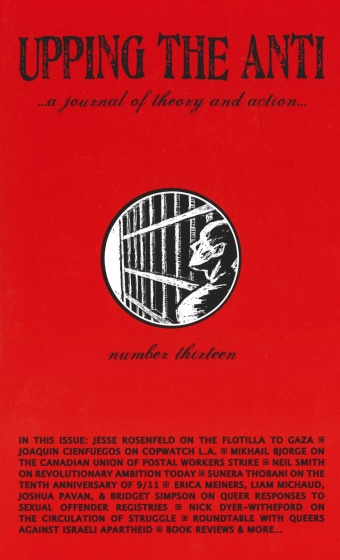Religion and Disaffection
Dear UTA,
Your Editorial regarding the political magnetism of the right is a welcome conversation piece for a Left too often unable to grasp that political subjectivity is messy, contingent, and unpredictable, and evades the tidy categories of the secular.
“The criticism of religion is the beginning of all criticism,” wrote Marx in 1843. Unfortunately, this observation has often been ignored as a super-structuralist slip, read narrowly as an injunction to emancipate social theory from its theological trappings, or, worse, as an assertion that this emancipation was already complete. Woe to those who would commit such errors!
We cannot deny that religiosity in neoliberal North America contributes to and expresses itself in highly reactionary policies; white, suburban, middle class evangelicals for whom getting “tough on crime” is a positive social good akin to conversion surely outnumber those quick to quote Gramsci at the dinner table. But as your editors suggest, time and money aren’t the only things at stake in the war of position. The mobilization of disaffection is about language, and the right knows how to use it.
Conservative MP Joy Smith’s prayerful declaration that it was “the good Lord” who passed Bill C-268 – at a self-styled “abolitionist” rally sponsored by MobilizingMen.com and hosted by a Winnipeg mega-church – was met with a rousing applause by the hundreds in attendance on June 5, 2011. Pride Day celebrations were obviously not Smith’s priority that night; indeed, of the many NGOs sporting information booths in the church lobby, the most chilling was that of Living Waters Canada, an organization offering “Christian support to men and women choosing to leave homosexuality.”
The trouble, then, is that what Marx called the “sigh of the oppressed creature” is a song with multiple registers. The veiled protests of the alienated intermingle with, and are usually drowned out by, the boisterous demands of charismatic reactionaries touting what those on the Right call “leadership qualities.” Fanatically secular liberals are quick to single out the latter as irrational, social-order-threatening dupes. Terry Eagleton has rightly drawn our attention to the dangerously classist presumptions of these New Atheists, arguing that the impoverished Pentecostal preacher in rural Guatemala contains more revolutionary potential in his left foot than Christopher Hitchens has in his entire repertoire of secular, neoliberal apologetics. And therein lies the counterintuitive proposition: that in the sigh of the wretched of earth we might discern the “soul of soulless conditions.”
The crowd on June 5 articulated a spirited, if misguided, opposition to “human trafficking.” Only the Left can properly diagnose this complex social problem, and yet the Right’s current discourse about “modern-day slavery” – a convenient trope that elides the question of what it means to be ‘free’ under capitalism – is guiding legitimate disaffection toward a host of socially violent resolutions. The response to Joy Smith’s altar-call-like keynote address was startlingly resolute: asked to “take a stand” against sex trafficking and child prostitution, dozens of “Godly men” rose from their seats, braved the aisles, and recited a prayerful pledge to cleanse their minds of sexual impurities. The object of critique was hazy – the evangelical imagination somehow conflates sex and infidelity, slavery and sin – but the sense of moral outrage was palpable. How, then, might the Left re-appropriate this disaffection? How might we imagine the ways in which these parishioners might be “part of our base”?
First and foremost, the Left needs to recognize the semantic and moral resources that so-called “religious communities” have to offer: the universalist impulse, the collective-action-inducing power of myth, and the radical potential of agape – a violent gesture of “uncoupling” from the prevailing social order.
MobilizingMen.com was born when a Grey Nun uttered a prophetic word about “combating sex slavery” to a room full of Mennonite soccer moms and their cubicle-bound, chivalry-obsessed husbands. The Christian right, less a political monolith with a discernible strategy than a site of cultural production with what Paul Apostolidis calls “weak but abiding negative-utopian ferment,” thrives on the ad hoc and heart-rending character of such initiatives. With this in mind, might we consider UTA editors’ call to recognize the “political importance of the affective register” as a call to renew the criticism of heaven; to contemplate the logic of the mega-church; to hold up the sacred, mirror-like, before our secular eyes? This is no easy enterprise, and not without risk. But thinking against religion may require thinking with it. Before the Left can retrieve its base, it will need to retrieve its utopian animus; its ability to countenance the sacred, the affective, and the seemingly reactionary vision of the seemingly de-politicized.
In solidarity,
Rob Stansel
Winnipeg

